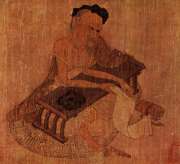|
Биография Wang Wei
Wang Wei (699-759) a fost un poet chinez din epoca dinastiei Tang (începutul Renașterii chineze). A fost un virtuos poet al naturii și un budist fervent care a preferat să rămână mirean, deținând chiar funcții înalte în aparatul de stat.
A fost, în același timp, și pictor, dar puține tablouri au fost păstrate, și numai sub formă de reproduceri realizate de alți artiști. Atât picturile cât și poemele sale au avut o mare influență asupra generațiilor viitoare.
***
Wang Wei (699–759) was a Tang Dynasty Chinese poet, musician, painter, and statesman. He was one of the most famous men of arts and letters of his time. His paintings survive only in later copies by other artists, but numerous poems are preserved and some were included in the highly influential 18th century anthology, Three Hundred Tang Poems.
Originally from Qi (Modern day Qi County of Shanxi), Wang Wei moved to PuZhou (today Yong Ji, Shanxi). He was of Han ethnicity. Born into an aristocratic family, Wang Wei passed the civil service entrance examination in 721 with being awarded Zhuang Yuan (placing first in the examination) and had a successful civil service career. During the An Lushan Rebellion he avoided actively serving the insurgents during the capital's occupation by pretending to be deaf; other sources state that he drank medicine which created cankers on his mouth and feigned sickness. After the suppression of the rebellion he was demoted and served as a TaiZi ZhongChong and over time was moved to the position of JiShiZhong and his last position was held as ShangShu YouCheng.
He spent ten years studying with Chán master Daoguang. After his wife's death in 730, he did not remarry and established a monastery on part of his estate.
He was famous for both his poetry and his paintings, about which Su Shi coined a phrase: "The quality of Wang Wei’s poems can be summed as, the poems hold a painting within them. In observing his paintings you can see that, within the painting there is poetry." He is especially known for his compositions in the Mountains and Streams genre, the landscape school of poetry, along with Meng Haoran; their family names were combined and they are commonly referred to as "Wang Meng" due to their excellence in poetic composition at that time. In his later years Wang Wei lost interest in being a statesman and became more involved in Buddhism and his poems reflected his focus on Zen/Ch'an practice, therefore he was posthumously referred to as the “Poet Buddha”. His works are collected in Secretary General Wang's Anthology, which includes 400 poems. He excelled in painting images of people, bamboo forests and scenery of mountains and rivers. It is recorded that his landscape paintings have two different genres, one of the Father and Son of the Li Family and the other being of strong brush strokes; his work of Picture of Wang River is of the latter, but unfortunately the original no longer exists. His works of Scenery of Snow and Creek and Jinan’s Fusheng Portrait are both realistic in their representation of the subjects.
He is best known for his quatrains depicting quiet scenes of water and mist, with few details and little human presence. The Indiana Companion comments that he affirms the world's beauty, while questioning its ultimate reality. It also draws a comparison between the deceptive simplicity of his works and the Chan path to enlightenment, which is built on careful preparation but is achieved without conscious effort.
A portrait of Fu Sheng, allegedly painted by Wang WeiNone of his original paintings survive, but copies of works attributed to him are also landscapes with similar qualities. He influenced what became known as the Southern school of Chinese landscape art, which was characterised by strong brushstrokes contrasted with light ink washes.
Wang Wei's most famous poetry, such as the poem "Deer Park", form a group titled Wang River Collection. They record a poet's journey, ostensibly that of Wang Wei and his close friend Pei Di. They are far more universal than a simple journey and have inspired generations of poets since, including recent adaptations such as Pain Not Bread's Introduction to the Introduction to Wang Wei, Barry Gifford's Replies to Wang Wei and Gary Blankenship's A River Transformed.
Eliot Weinberger and Octavio Paz's 19 Ways of Looking at Wang Wei is an essay concerning more than 19 translations of Wang Wei's "Deer Park".
|





